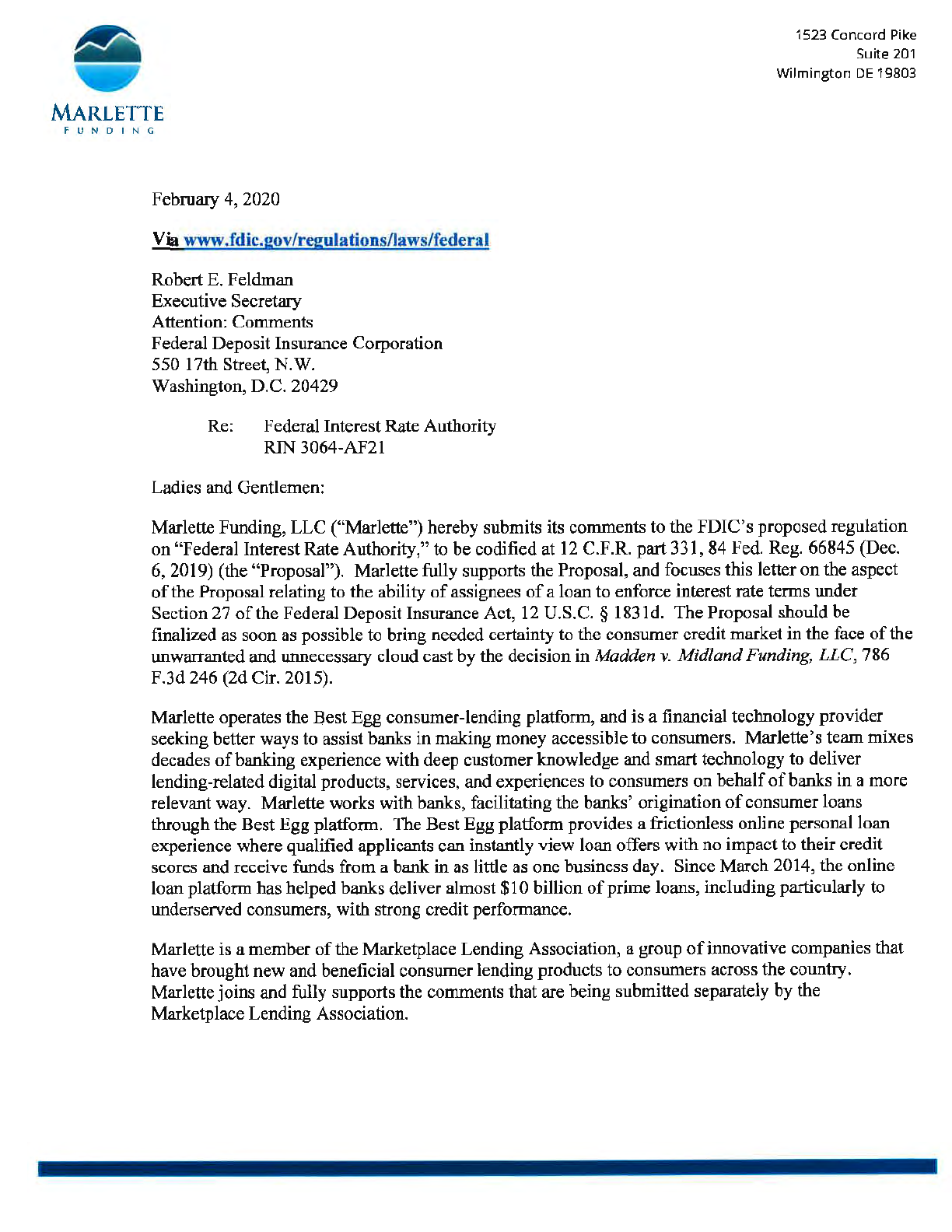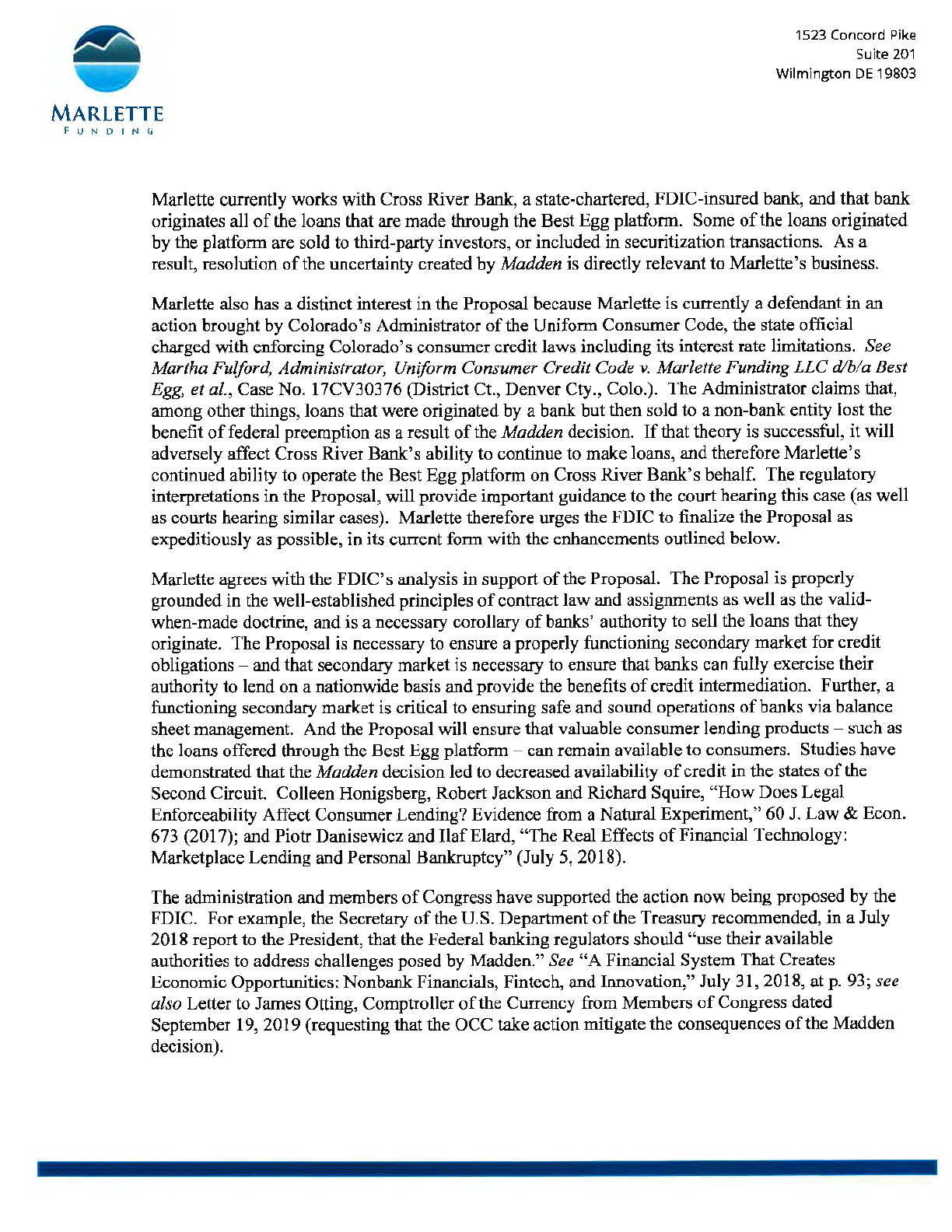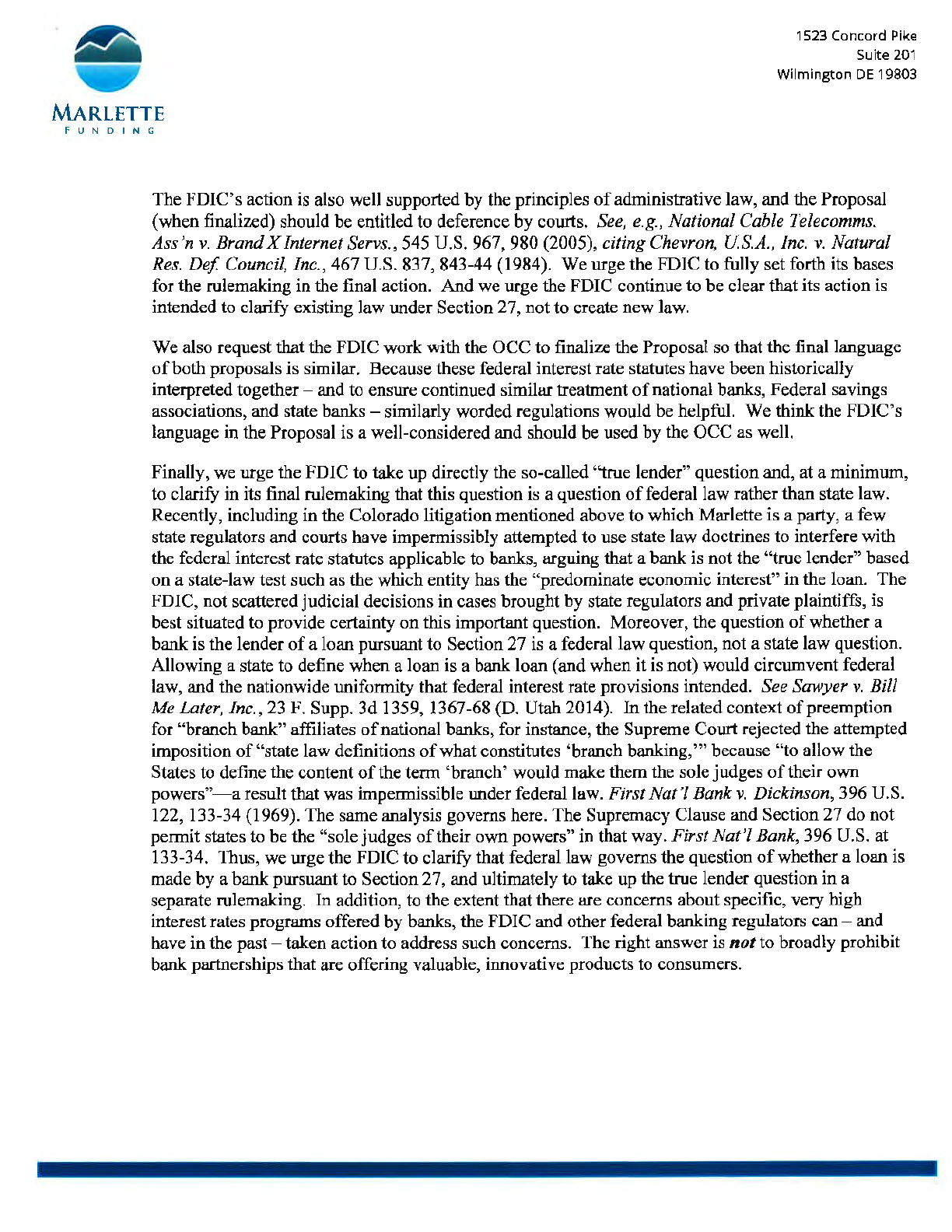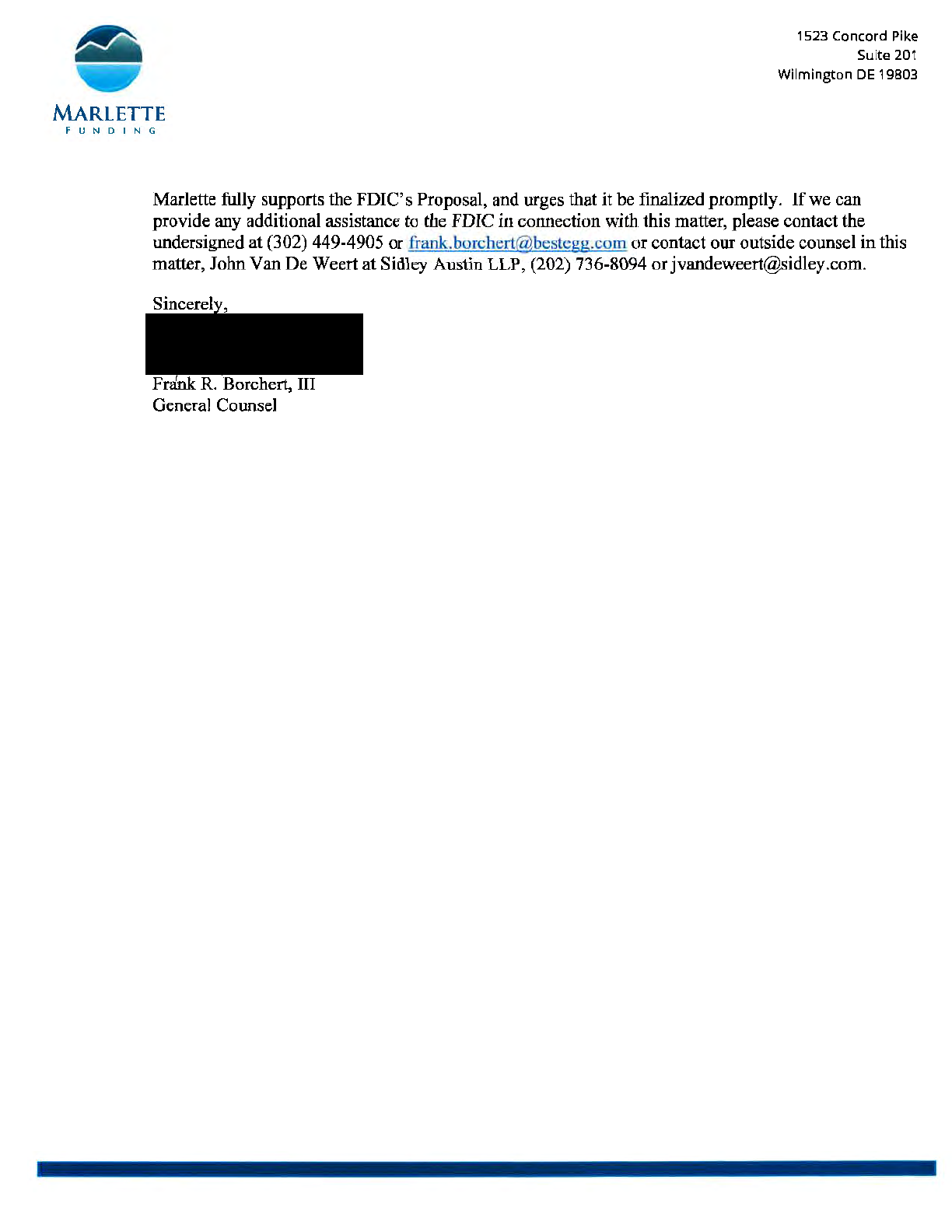
MARLETTE
FUNDING
February
4,
2020
Via www.fdic.gov/regulations/laws/federal
Robert
E.
Feldman
Executive Secretary
Attention: Comments
Federal Deposit Insurance Corporation
550 17th Street, N.W.
Washington, D.C.
20429
Re: Federal Interest Rate Authority
RIN
3064-AF21
Ladies
and
Gentlemen:
1523 Concord Pike
Suite
201
Wilmington
DE
19803
Marlette Funding,
LLC
("Marlette") hereby submits its comments to
the
FDIC's
proposed regulation
on
"Federal Interest Rate Authority," to
be
codified
at
12 C.F.R.
part
331,
84
Fed. Reg. 66845 (Dec.
6, 2019) (the "Proposal"). Marlette fully supports
the
Proposal,
and
focuses
this
letter
on
the
aspect
of
the
Proposal relating
to
the
ability
of
assignees
of
a loan
to
enforce interest
rate
terms
under
Section 27
of
the
Federal Deposit Insurance Act,
12
U.S.C. § 1831d.
The
Proposal should
be
finalized
as
soon
as possible to bring needed certainty
to
the
consumer credit market
in
the
face
of
the
W1warranted
and
unnecessary cloud
cast
by
the
decision
in
Madden
v.
Midland
Funding, LLC, 786
F.3d
246
(2d
Cir. 2015).
Marlette operates
the
Best
Egg
consumer-lending platform,
and
is
a financial technology provider
seeking better ways to assist banks
in
making
money accessible
to
consumers.
Marlette's
team
mixes
decades
of
banking experience
with
deep customer knowledge
and
smart
technology
to
deliver
lending-related digital products, services,
and
experiences
to
consumers
on
behalf
of
banks
in
a more
relevant way. Marlette works
with
banks, facilitating
the
banks'
origination
of
consumer loans
through
the
Best
Egg
platform. The
Best
Egg
platform provides a frictionless online personal loan
experience
where
qualified applicants
can
instantly
view
loan offers
with
no
impact
to their credit
scores
and
receive funds from a
bank
in
as little as
one
business day. Since
March
2014,
the
online
loan platform
has
helped
banks
deliver almost
$10
billion
of
prime
loans, including particularly to
underserved consumers, with strong credit performance.
Marlette
is
a
member
of
the
Marketplace Lending Association, a group
of
innovative companies
that
have brought
new
and
beneficial consumer lending products
to
consumers across the country.
Marlette
joins
and
fully supports
the
comments
that
are being submitted separately
by
the
Marketplace Lending Association.

MARLETTE
FUNDINCi
1523 Concord Pike
Suite
201
Wilmington
DE
19803
Marlette currently works with Cross River Hank, a state-chartered, FDIC-insured bank, and that bank
originates all
of
the loans that are
made
through the Best Egg platform. Some
of
the loans originated
by
the platform are sold
to
third-party investors,
or
included in securitization transactions.
As
a
result, resolution
of
the uncertainty created
by
Madden
is
directly relevant
to
Mariette's business.
Marlette also has a distinct interest
in
the Proposal because Marlette
is
currently a defendant
in
an
action brought
by
Colorado's Administrator
of
the Uniform Consumer Code, the state official
charged with enforcing Colorado's consumer credit laws including
its
interest rate limitations. See
Martha Fulford, Administrator, Unfform Consumer Credit Code
v.
Marlette Funding
LLC
dlbla Best
Egg,
et
al., Case No. 17CV30376 (District Ct., Denver Cty., Colo.).
The
Administrator claims that,
among other things, loans that were originated
by
a bank
but
then sold
to
a non-bank entity lost the
benefit
of
federal preemption
as
a result
of
the Madden decision.
If
that theory is successful,
it
will
adversely affect Cross River
Bank's
ability to continue
to
make
loans,
and
therefore Mariette's
continued ability
to
operate the Best Egg platform
on
Cross River
Bank's
behalf. The regulatory
interpretations
in
the Proposal, will provide important guidance to the court hearing this case ( as well
as courts hearing similar cases). Marlette therefore urges
the
FDIC
to
finalize the Proposal
as
expeditiously
as
possible, in its current
fonn
with
the enhancements outlined below.
Marlette agrees with the
FDIC's
analysis
in
support
of
the Proposal.
The
Proposal
is
properly
grounded
in
the well-established principles
of
contract
law
and assignments
as
welJ as the valid-
when-made doctrine, and
is
a necessary corollary
of
banks' authority
to
sell the loans that they
originate.
The
Proposal is necessary to ensure a properly functioning secondary market for credit
obligations - and that secondary market
is
necessary to ensure that banks can fully exercise their
authority
to
lend
on
a nationwide basis
and
provide
the
benefits
of
credit intermediation. Further, a
functioning secondary market
is
critical
to
ensuring safe and sound operations
of
banks
via
balance
sheet management. And the Proposal
will ensure
that
valuable consumer lending products - such as
the loans offered through the
Best
Egg
platform -
can
remain available
to
consumers. Studies have
demonstrated that the
Madden decision
led
to decreased availability
of
credit in the states
of
the
Second Circuit. Colleen Honigsberg, Robert Jackson and Richard Squire,
"How
Does
Legal
Enforceability Affect Consumer Lending? Evidence from a Natural Experiment,"
60
J.
Law
& Econ.
673 (2017); and Piotr Danisewicz and
Ilaf
Elard,
"The
Real Effects
of
Financial Technology:
Marketplace Lending and Personal Bankruptcy" (July
5, 2018).
The administration and members
of
Congress have supported the action now being proposed
by
the
FDIC.
For
example, the Secretary
of
the U.S. Department
of
the Treasury recommended,
in
a July
2018 report
to
the President, that the Federal banking regulators should
"use
their available
authorities
to
address challenges posed
by
Madden." See
"A
Financial System That Creates
Economic Opportwtlties: Nonbank Financials, Fintech, and Innovation," July 31, 2018,
at
p. 93; see
also
Letter to James Otting, Comptroller
of
the Currency from Members
of
Congress dated
September 19, 2019 (requesting that
the
OCC
take action mitigate the consequences
of
the Madden
decision).

MARLETTE
FUNDING
1523 Concord Pike
Suite
201
Wilmington
DE
19803
The
FDIC's
action is also well
supported
by the principles
of
administrative
law,
and
the
Proposal
(when
finalized) should
be
entitled
to
deference
by
courts. See, e.g., National Cable Telecomms.
Ass'n
v.
BrandX
Internet Servs., 545 U.S.
967,980
(2005), citing Chevron, US.A., inc.
v.
Natural
Res.
Def
Council, Inc.,
467
U.S. 837, 843-44 (1984).
We
urge
the
FDIC
to
fully
set
forth its
bases
for
the
rulemaking
in
the
final action.
And
we
urge
the
FDIC
continue
to
be
clear
that
its
action
is
intended
to
clarify existing
law
under
Section
27,
not
to
create
new
law.
We
also
request
that
the
FDIC
work
with
the
OCC
to
finalize
the
Proposal
so
that
the
final language
of
both
proposals
is
similar.
Because
these
federal interest
rate
statutes
have
been
historically
interpreted
together
-
and
to
ensure
continued
similar
treatment
of
national banks, Federal savings
associations,
and
state
banks
- similarly
worded
regulations
would
be
helpful.
We
think
the
FDIC's
language in
the
Proposal
is
a well-considered
and
should
be
used
by
the
OCC
as
well.
Finally,
we
urge
the
FDIC
to
take
up
directly the so-called
"true
lender"
question
and,
at
a
minimum,
to
clarify
in
its final rulemaking
that
this question
is
a question
of
federal
law
rather
than
state
law.
Recently, including
in
the
Colorado litigation
mentioned
above
to
which
Marlette
is
a party, a
few
state regulators
and
courts
have
imperrnissibly attempted
to
use
state
law
doctrines
to
interfere
with
the federal interest rate statutes applicable
to
banks, arguing
that
a
bank
is
not
the
"true
lender"
based
on
a state-law
test
such
as
the
which
entity
has
the
"predominate
economic
interest"
in
the
loan.
The
FDIC,
not
scattered
judicial
decisions
in
cases
brought
by
state regulators and private plaintiffs, is
best
situated
to
provide
certainty
on
this
important
question. Moreover,
the
question
of
whether
a
bank
is
the
lender
of
a
loan
pursuant
to
Section
27
is a federal
law
question,
not
a
state
law
question.
Allowing
a state
to
define
when
a
loan
is a
bank
loan
(and
when
it
is
not)
would
circumvent
federal
law,
and
the
nationwide uniformity
that
federal interest
rate
provisions intended. See Sawyer
v.
Bill
Me Later, Inc.,
23 F. Supp.
3d
1359, 1367-68 (D.
Utah
2014).
In
the
related
context
of
preemption
for
"branch
bank"
affiliates
of
national
banks,
for instance,
the
Supreme
Court rejected
the
attempted
imposition
of
"state
law
definitions
of
what
constitutes
'branch
banking,'"
because
"to
allow
the
States
to
define
the
content
of
the
term
'branch'
would
make
them
the
sole
judges
of
their
own
powers"-a
result
that
was
impermissible
under
federal law. First
Nat'/
Bank
v.
Dickinson,
396
U.S.
122, 133-34 (1969).
The
same
analysis governs here.
The
Supremacy
Clause
and
Section
27
do
not
permit
states
to
be
the
"sole
judges
of
their
own
powers"
in
that
way. First
Nat'/
Bank,
396
U.S.
at
133-34.
Thus,
we
urge
the
FDIC
to
clarify
that
federal
law
governs
the
question
of
whether
a
loan
is
made
by
a
bank
pursuant
to
Section
27,
and
ultimately
to
take
up
the
true
lender
question
in
a
separate rulemaking.
In
addition,
to
the
extent
that
there
are
concerns
about
specific,
very
high
interest rates
programs
offered
by
banks,
the
FDIC
and
other
federal
banking
regulators
can-
and
have
in
the
past
-
taken
action
to
address
such
concerns.
The
right
answer
is
not
to
broadly prohibit
bank
partnerships
that
are
offering valuable, innovative
products
to
consumers.

F
-
1523 Concord Pike
Suite 201
Wilmington
DE
19803
MARLETTE
FUNDING
Marlette fully supports
the
FDIC's
Proposal,
and
urges that
it
be
finalized promptly.
lfwe
can
provide any additional assistance to
the
FDIC
in
connection with
this
matter, please contact the
undersigned
at
(302) 449-4905
or
frank:.borchert@bestcgg.
com
or
contact
ow
outside counsel
in
this
matter,
John Van
De
Weert
at
Sidley Austin LLP, (202) 736-8094
or
Fr
ank
R.
Bor
chert, III
General
Co
un
se
l
